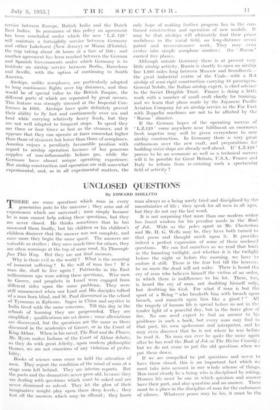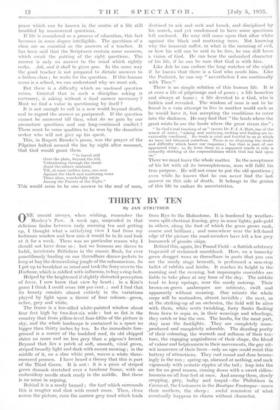UNCLOSED QUESTIONS
By EDWARD SHILLITO
THERE are some questions which man in every generation puts to' the universe ; they arise out of experiences which are universal ; man simply because he is man cannot help asking these questions, but they are never closed. He thinks sometimes that he has answered them finally, but his children or his children's children ,discover that the answer was not complete, and once more they begin the same quest. The answers arc valuable as studies ; they save much time for others, they are often warnings at the top of some road, No Thorough- fare This .Way. But they are not final. answers. Why is there evil in the world ? • What is the meaning, of, innocent suffering,? Is the will of man free ? If a man die, ,shall he live, again ? Patriarchs in the East millenniums ago were asking these questions. Wise men in Greece, and prophets in Israel were engaged, from different sides upon the same problem§. They were still unanswered when our Lord and His disciples talked Of a nian born blind, and St. Paul discoursed in the school of Tyrannus in Ephesus. Sages in China and mystics in India liVed with the same concerns. Till this day in the schools of learning they arc propounded. They arc simplified ; qualifications are set down ; some alleviations are discovered, but the questions are the same as those discussed in the academies of Greece, or in the Court of King Akbar. When in his novel, The Root and the Flower, Mr. Myers makes Indians of the Court of Akbar debate, as they do with great felicity,: upon modern philosophic themes, we arc not conscious of any violation of proba- bility. • Books of science soon cease to hold the attention of men. They report the condition of the mind of man at a stage soon left behind. They arc interim reports. But the poets and the dramatists never 'grow old, because they are dealing with questions 'which must be asked and arc never dismissed' as solved. They let the glow of their imaginative insight, play upon, these deep levels.; they: test all the answers which may be offered ; they know man always as a being sorely tried and disciplined by the uncertainties of life ; they speak for all men in all ages, but they do not say the last word. It is not surprising that more than one modern writer has found wisdom for his peculiar needs in the Book of Job. Wide as the poles apart as Mr. Chesterton and Mr. H. G. Wells may be, they have both turned to that poem and thought much upon it. It prOvides indeed a perfect expression of some of these unclosed questions. We can feel ourselves as we read that boo: in the haunting twilight, and whether it is the twilight before the night or .before the morning, we have to endure . it still: There is the fear lest till the heaven be no more the dead will not wake. There is heard the, cry of man who believes himself the victim of an order; in which there is indifference to his lot. There; too,. is heard the cry of man, not doubting himself only, but doubting his Gcd. For what if man is but the sport of a Being " who breaketh him with breach. upon breach, and runneth upon him like a giant ? " All the tragedy of human life is spread before us not in the tender light of a peaceful day, but in the fierce glow of fire. No one need expect to find an answer to hi3 problems in such a book, but every man may find in that poet, his own spokesman and interpreter, and he may even discover that he is not where he was before he read it. . No man can ever be quite the same again after he has read the Book of Job or The Divine Comedy ; but we do not cease to put the old questions when we put them down. If we are compelled to put questions and never to have them closed, this is an important fact which we must take into account in our w hole scheme of things.
Man must clearly be a being who is disciplined by asking. Human life must be one in which question and answer have their part, and also q uestion and no answer. There must be a place in the discipline of man for the endurance of silence. • Whatever peace may be his, it must be the peace which can be known in the centre of a life still troubled by unanswered questions.
If life is considered as a process of education, this fact becomes in some degree intelligible. The questions of a class are as essential as the answers of a teacher. It has been said that the Scriptures contain some answers, which await the putting of the right questions. The, answer is only an answer to the mind which rightly seeks. Ask, and it shall be given you. In the same way the good teacher is not prepared to dictate answers to a listless class ; he waits for the question. If this human scene is a school, we can understand why we must ask.
But there is a difficulty which an unclosed question raises. Granted that in such a discipline asking is necessary, is asking without a final answer necessary ? Must we find a value in questioning by itself ?
It is not enough to call in a new world beyond death, and to regard the answer as postponed. If the question cannot be answered till then, what do we gain by our premature questions and our long-continued conflict ? There must be some qualities to be won by the dauntless. seeker who will not give Up his quest This, in Rupert Brooke's poem, was the prayer of the Pilgrims halted around the fire by night after moonset, that God would grant them " to travel still Over the plain, beyond the hill, Unhesitating through the shade Amid the silence unafraid, Till, at some sudden turn, one sees Against the black and muttering trees Thine altar, wonderfully white Among the Forests of the Night."
This would seem to be one answer to the soul of man, destined to ask and seek and knock, and disciplined by' his search, and yet condemned to have some questions left unclosed. He may still come upon that altar white against the black and muttering trees. Not knowing why the innocent suffer, or what is the meaning of evil,. or how his will can be said to be free, he can still have a vision of God. He can bear the unfinished character of his life, if he can be sure that God is with him.
Like Job he can endure the long watches of the night if he knows that there is a God who needs him. Like the Psalmist, he can say " nevertheless I am continually. With Thee."
There is no simple solution of this human life. It is at once a life of pilgrimage and of peace ; a life homeless and always at home ; a life devoted to a God, who is hidden and revealed. The wisdom of man is not to be found in a vain attempt to live in another world such as he would have it, but accepting the conditions to enter into the darkness. He may find that "the lands where the great mists lie are the lands where the great rivers rise" ;
" In God's real teaching of us" (wrote Dr. F. J. A. Hort, one of the wisest of men), " asking and receiving, seeking and finding are in- extricably combined. No truth is vital and fruitful to us at which we have not laboured ourselves. There is no disguising the doubt and difficulty which beset our enquiries ; but that is part of our appointed trial ; to fly from them to a supposed oracle is only a cowardly shirking of the responsibilities which God has laid upon
us."
There we must leave the whole matter. In the acceptance of-his lot with all its incompleteness, man will fulfil his true purpose. He will not cease to put the old questions even while he knows that he can never find the last answer on this side of death. It belongs to the genius of this life to endure its uncertainties.















































 Previous page
Previous page